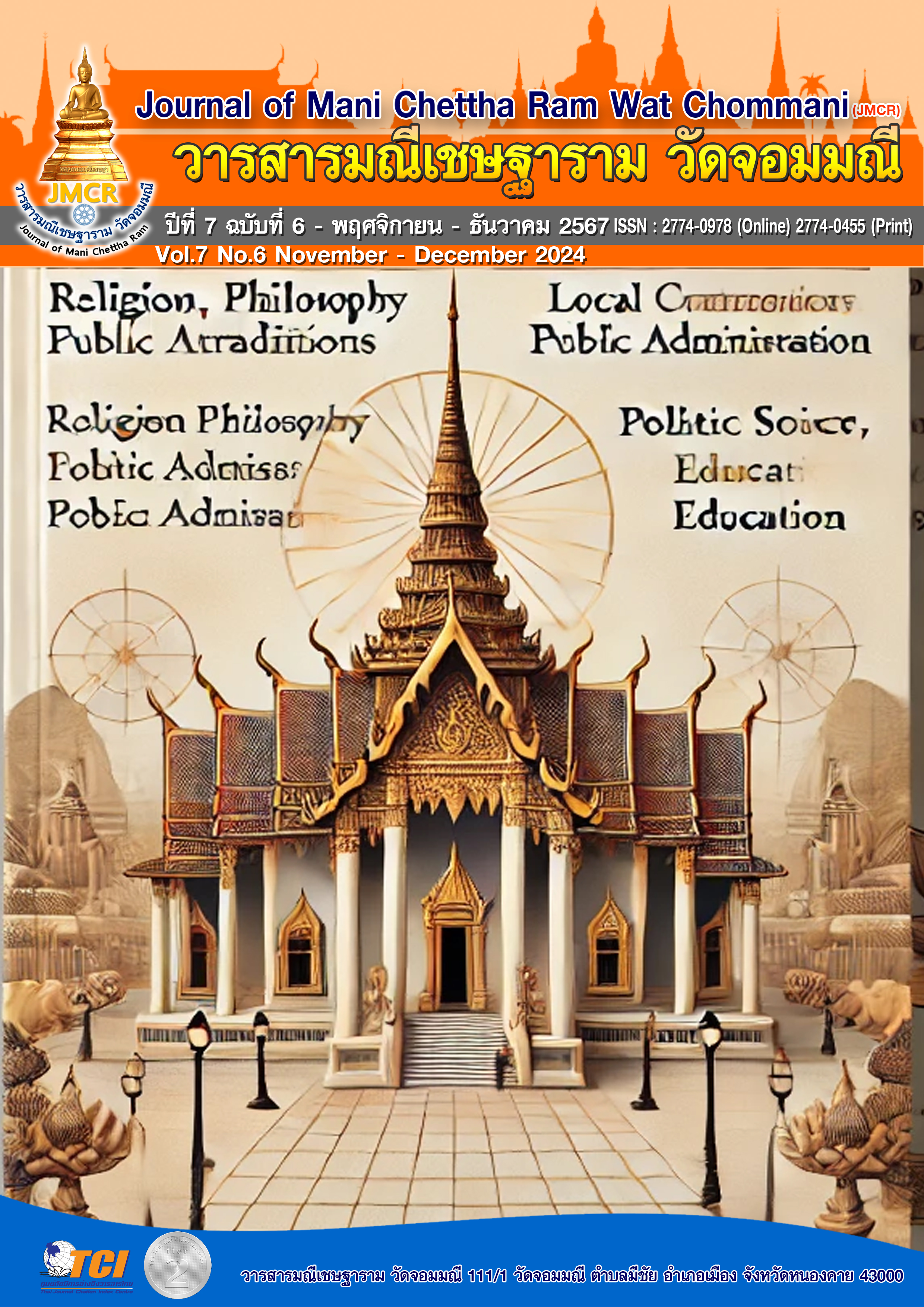INTEGRATION OF THE FOUR RDDHIPPADA (DHAMMA FOR SUCCESSFUL) AND GOOD GOVERNANCE AFFECTING THE EFFECTIVENESS OF SUBDISTRICT MUNICIPALITIES IN CHONBURI PROVINCE
Keywords:
Four Rddhippada, Good Governance, EffectivenessAbstract
This research aims to 1) study the effectiveness of sub-district municipalities in Chonburi Province 2) analyze the integration of the four principles of Dhamma and good governance that affect the effectiveness of sub-district municipalities in Chonburi Province and 3) propose guidelines for developing the effectiveness of sub-district municipalities in Chonburi Province. The research methodology is a mixed-methods quantitative research. The sample is 400 people aged 18 years and over who are eligible to vote in sub-district municipalities in Chonburi Province. The research instrument is a questionnaire. Data analysis includes frequency, percentage, mean, standard deviation, and multiple regression analysis. Qualitative research, 20 key informants, the research instrument is an in-depth interview. Data analysis is done by descriptive content analysis.
The results of the study found that 1) The overall organizational effectiveness of sub-district municipalities in Chonburi Province is at a high level. The average values are ranked from highest to lowest: competition-value, system, goal achievement, and strategic-specific, respectively. 2) The integration of the four principles of Dhamma and good governance of sub-district municipalities in Chonburi Province, the principle of diligence, the principle of consensus, and the principle of transparency and the principle of investigation affects the effectiveness of sub-district municipalities in Chonburi Province with a statistical significance level of .05 and 3) guidelines for developing the effectiveness of sub-district municipalities in Chonburi Province by using the principles of the Four Bases of Dhamma in operations along with the use of good governance principles in terms of transparency and focusing on consensus so that operations are smooth and achieve the set goals in a tangible and empirical way.
References
องกาญจน์ พฤฒิพฤกษ์. (2565). อิทธิบาท 4 ของผู้บริหารและพนักงานที่มีผลต่อความสำเร็จในการดำเนินกิจการ กรณีศึกษา : บริษัท สตาร์มาร์คแมนูแฟคเชอร์ริ่ง จำกัด จังหวัดสมุทรสาคร. กรุงเทพมหานคร: มหาวิทยาลัยศิลปากร.
กิตติวัฒน์ รัตนดิลก ณ ภูเก็ต. (2553). คู่มือศึกษาพื้นฐานวิชากฎหมายเกี่ยวกับการบริหารราชการแผ่นดิน (กฎหมายเกี่ยวกับการบริหารราชการไทย). (พิมพ์ครั้งที่ 3). กรุงเทพมหานคร: เสมาธรรม.
โกวิทย์ พวงงาม. (2550). การปกครองท้องถิ่นไทย หลักการ และมิติใหม่ในอนาคต. (พิมพ์ครั้งที่ 5). กรุงเทพมหานคร: วิญญูชน.
บุญทัน ดอกไธสง. (2551). การจัดการทุนมนุษย์. กรุงเทพมหานคร: สำนักพิมพ์ตะวัน.
พระครูอุทัยสุตกิจ. (2558). ความสำเร็จของการบริหารงานตามหลักอิทธิบาทสี่ของพระสงฆ์ ในการเผยแผ่พระพุทธศาสนาในเขตพื้นที่จังหวัดอุทัยธานี. วารสารสมาคมนักวิจัย, 20(2), 161-171.
ผอบทอง สุจินพรัหม. (2556). การนำหลักธรรมอิทธิบาท 4 มาใช้ในการบริหารงานของผู้บริหารสถานศึกษา ตามทรรศนะของบุคลากรในโรงเรียนมัธยมศึกษาขนาดใหญ่พิเศษจังหวัดศรีสะเกษ สังกัดสำนักงานเขตพื้นที่การศึกษามัธยมศึกษา เขต 28. วารสารมหาวิทยาลัยมหามกุฏราชวิทยาลัย วิทยาเขตร้อยเอ็ด, 5(2), 101-111.
สัมฤทธิ์ สุขสงค์. (2555). ประสิทธิผลการบริหารงานขององค์การบริหารส่วนตำบลกรณีศึกษาองค์การบริหารส่วนตำบลในจังหวัดกาฬสินธุ์. ใน วิทยานิพนธ์รัฐประศาสตรมหาบัณฑิต สาขานโยบายสาธารณะ. มหาวิทยาลัยมหาสารคาม.
สุพันธ์ แสนสี. (2558). การประยุกต์ใช้หลักอิทธิบาท 4 เพื่อส่งเสริมประสิทธิภาพการยริหารจัดการโรงเรียนกีฬาจังหวัดขอนแก่น มัธยมศึกษาตอนปลาย. ใน วิทยานิพนธ์พุทธศาสตรมหาบัณฑิต สาขาวิชาการพุทธบริหารการศึกษา. มหาวิทยาลัยมหาจุฬาลงกรณราชวิทยาลัย.
สุทธิพงษ์ ศรีวิชัย. (2550). หลักการบริหารการศึกษาตามแนวพุทธศาสตร์. ใน สารนิพนธ์พุทธศาสตรบัณฑิต สาขาวิชาการพุทธบริหารการศึกษา. มหาวิทยาลัยมหาจุฬาลงกรณราชวิทยาลัย.




